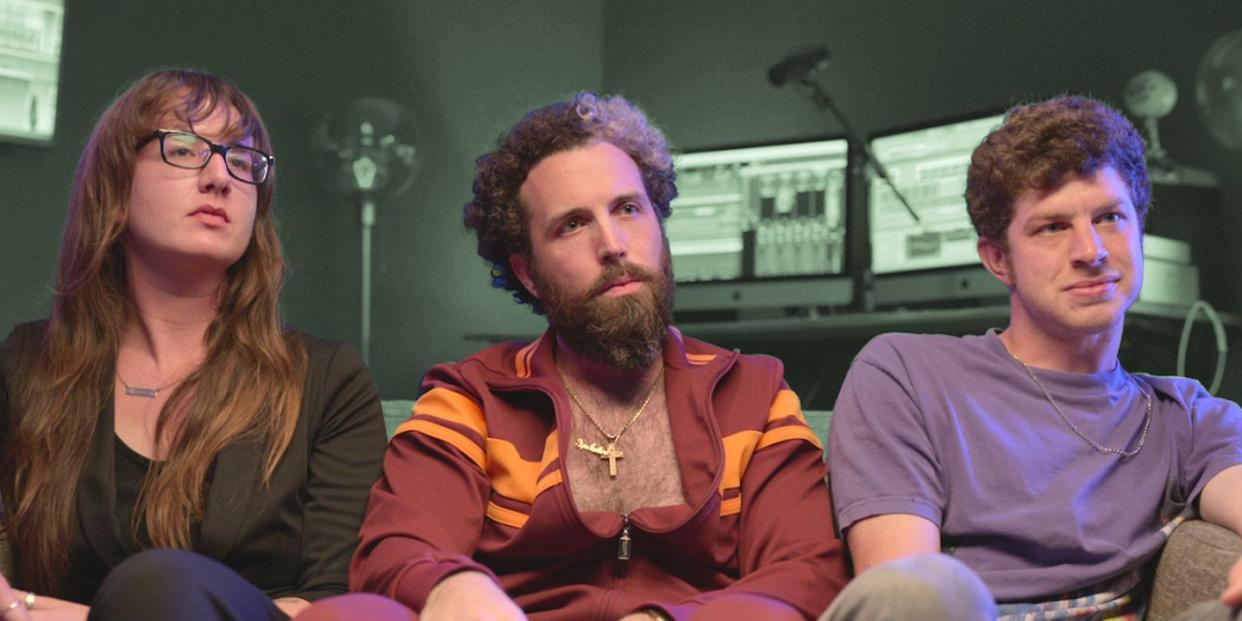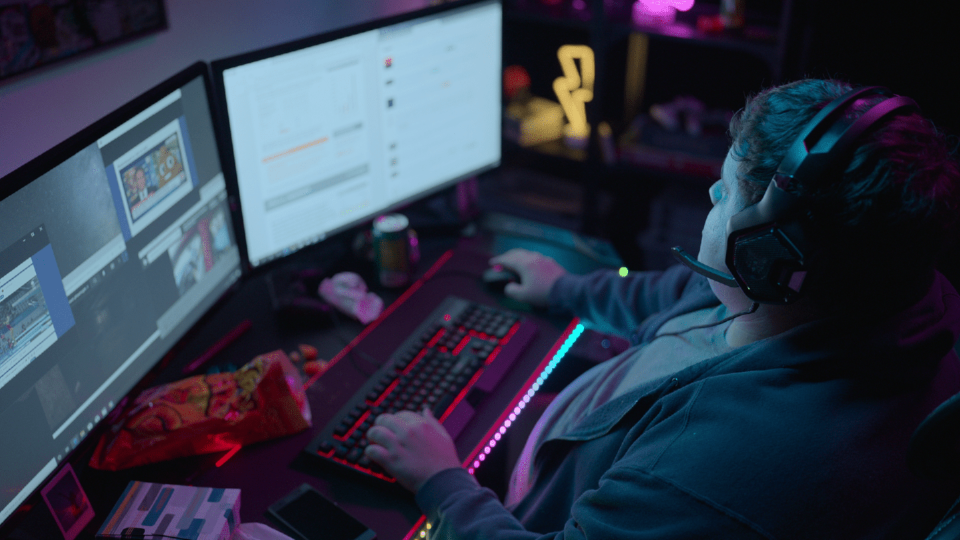'Eat the Rich: The GameStop Saga' Fails Its Heroes—And Villains

One of the lasting, disorienting legacies of the pandemic is the warping effect it had on our perception time. Stuck inside, our lives on pause, days often blended together into one indistinguishable, monotonous mass.
Nowhere is that phenomenon more apparent than when reminiscing about the GameStop stock saga, a frenzy that feels so temporally and emotionally distant that it’s hard to believe it occurred only a year and a half ago. In late 2020 and early 2021, a group of ragtag retail investors—using r/WallStreetBets, a Reddit forum for trading stock tips, as their rallying point—nearly toppled the financial establishment. The Reddit bros used their collective might to pump up the price of several “meme stocks,” the most famous of them GameStop, to turn a quick buck. But the WSB bros realized many Wall Street firms were shorting those same stocks and they could inflict serious damage on these institutional investors by driving prices even higher—at which point the activity became less about making money and more about class warfare.
A bored, quarantine-weary nation was captivated by the idea of sticking it to the fatcats on Wall Street, so people who were entirely unacquainted with WSB and retail investing got in on the fun. The price of meme stocks skyrocketed to cartoonish heights (“To the moon!”), ultimately costing institutional investors more than $20 billion. This wasn’t retail investors developing novel investment strategies; it was ordinary folks exacting revenge on a financial system that, in their minds, works only to the benefit of an already wealthy few.
Now the WSB saga has entered its inevitable streaming content phase. Netflix’s Eat The Rich docuseries is the first of many film and TV projects about the happenings of early 2021. Rather than serve as a feel-good film about Internet underdogs getting the best of Wall Street douchebags, Eat the Rich, out today, is a sobering reminder of a financial grassroots movement that never realized its potential—and feels like a distant memory.
A year and a half since WSB nearly bankrupted a couple of hedge funds, the promise of WSB, of tipping the scales of power to favor everyday people, feels completely dead. Stock prices have fallen off a cliff this year, erasing trillions of dollars in wealth. Inflation is at its highest level in decades, severely limiting people’s purchasing power. Some experts say we’re inching toward a recession; others say we’re already in one. That’s a far cry from the halcyon days of the GameStop price pump, when it seemed like anyone could easily make a few Gs using the Robinhood app from their couch.

Eat the Rich is not a great documentary. In fact, for a three-episode documentary series about a complex, multi-faceted finance story, loaded with heroes and villains, it’s remarkably myopic and elementary. The series focuses on GameStop and the people who invested in it, completely disregarding the people who made millions of dollars placing option bets on Tesla, Blackberry, and Peloton.
The documentary doesn’t even attempt to explain options, which were critical to the culture and success of WSB. Unlike buying shares of a stock outright, options give the buyer the option, but not the obligation, to buy a stock at a future date at a particular price. Buyers have to pay a premium upfront for an option, but aside from that, they’re relatively risk-free. If the stock price moves in your favor, you exercise the option and net a tidy profit. If not, you lose only your premium.
WSB loves options because they offer infinite upside. If the stock price keeps moving in your favor, there’s no limit to the amount of money you can make off an options contract. Many WSB members used options in 2021 to amass small fortunes. (Or they went broke trying.) Eat the Rich doesn’t mention options at all, instead focusing on people who bought GameStop stock outright, which, by the time many of them got in, was a sucker’s bet.
The documentary tries to capture the shit-posting fun of WSB by featuring GIFs and cheesy B-roll footage in its transition shots, but the effort comes across as cringe. It’s a Schoolhouse Rock approach to WSB, but with half the charm and wit—and none of the catchy numbers. (Eat the Rich does have a pair of Lil’ Dicky-styled white rappers performing their song about the GameStop stock rally, though.)
Eat the Rich does contain a couple of poignant moments. In Episode Two of the series, Andrew Left—founder of market research publication Citron Research and a sworn enemy of WSB—gives this piece of analysis: “Stocks used to follow the truth. If you found the truth, you can find the stock price. What happens when they become detached, the truth and the stock?” The GameStop short squeeze was an example of such detachment. GameStop had an outdated business model and its stock price surge didn’t reflect that reality. It reflected the fickle hive mind of WSB.
Left’s comment inadvertently touches on a deeper sentiment, which is how many people feel like the financial markets are always detached from reality. The financial reality of Americans over the last four decades has been one of angst and precarity. Wages haven’t kept pace with inflation, housing is prohibitively expensive for a larger swath of the population and the American Dream feels increasingly out of reach. Yet as everyone on Main Street struggles, Wall Street seems just fine. Even when Wall Street fucks up and tanks the entire economy, it gets bailed out to the tune of billions of dollars. If there’s a detachment, it’s between the lived economic experience of ordinary American citizens and the people charged with caring for their investments.
Anyone who followed WSB in realtime probably won’t learn anything new from Eat the Rich. That the filmmakers felt they had to dumb down the particularities of the GameStop saga reflects another depressing truth about the public’s relation to the world of high finance: most Americans are financially illiterate, and most of them don’t give a shit to learn.
When I first started reporting on WSB, I was impressed with the way its members used options to make smart bets on the market and pocket some good cash for themselves. Options are a form of derivatives, complex financial instruments unknown to most people outside of the finance industry. Witnessing everyday people wield them effectively gave me hope that retail traders would become a formidable market force and wrest some power away from institutional investors. Usually when the financial markets capture national attention, it means something catastrophic has happened. WSB was the rare occasion where ordinary people followed market fluctuations with utter glee, and it seemed like it would result in lasting public engagement with the markets.
Wall Street was even feeling the heat. Respected wealth management firms wrote white papers on the “The Rise of Retail Traders,” warning about how Reddit shit-posters could manipulate markets at a whim. Indeed, retail trading accounted for 25 percent of all trading activity during the meme stock mania. Retail trading has subsided since then, but it’s still above pre-pandemic levels.
People who took up retail trading amid the GameStop surge and continue to play the markets have learned the hard way that it’s hard to pick stocks when there’s not an army of Redditors behind you. The market at large is down considerably since 2021 and GameStop, specifically, has lost nearly half its value over the past 12 months. On a cultural level, there hasn’t been a sustained interest to engage with and possibly reform the financial system. As Eat the Rich notes, WSB reminds us of the Occupy movement that took hold after the 2008 financial crisis—a flurry of righteous indignation that fails to affect much systemic change.
Increasingly, the events of the WSB insurrection seem like what famed options trader Nassim Nicholas Taleb would call a “black swan,” a once in a lifetime opportunity to acquire wealth due to an unlikely confluence of circumstances.
In the case of WSB, it was an entire country of young people stuck at home because of the biggest public health crisis in a century. They were all flush with cash because of government assistance payments, and the stock market was being upheld by a Federal Reserve that was willing to pump trillions of dollars into the economy and cut interest rates to zero. Apps like Robinhood made retail trading easier than ever, and once the news got out about some Redditors trolling Wall Street, an idle populace thought they, too, could get in on the fun and make a little money doing it.
We now know that the stock prices of the pandemic were indeed artificially inflated—not by Redditors, but by monetary and fiscal policy—and we’re suffering the resultant market correction.
WSB wasn’t a lasting revolution. It was a blip.
You Might Also Like